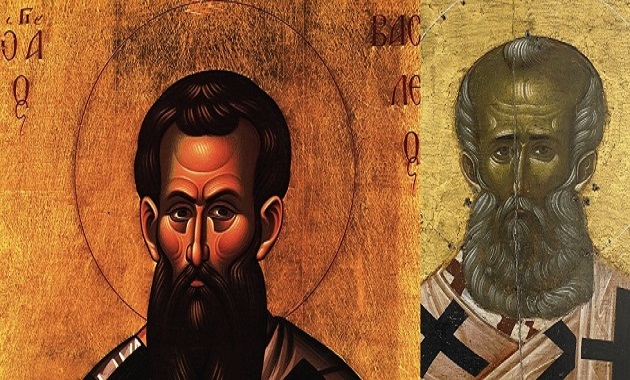Basil the Great Writes to Saint Gregory the Theologian – 2
31 January 2018It should be noted here that the Niptic Fathers, among whom were Saint Gregory Palamas and Saint Nikodimos the Athonite, used this last passage in Saint Basil in order to establish and interpret the cyclical method of the prayer of the heart.
2) Saint Basil goes on to say that another requirement is study of the Holy Scriptures. “The study of inspired Scripture is the principal way of finding our duty, because in Scripture we find both instruction about proper conduct and the lives of blessed people, transmitted in writing, like breathing images of godly living, so that we may imitate their good works. Thus, in whatever aspect people feel deficient, they can devote themselves to this imitation, and find the correct medicine for their ailment”.
3) “Prayers too, after reading, find the soul fresher and more vigorously stirred to love towards God. And the prayer which is good is that which instils a clear idea of God in the soul; God dwells in us when recollect Him as being established within us. We thus become God’s Temple, when the continuity of our recollection is not disturbed by worldly cares, when the mind is not harassed by sudden sensations, when worshippers flee from all things and retreat to God, expunging all the feelings that invite them to self-indulgence, and, instead, pass their time in the pursuits that lead to virtue”.
4) Above all, Saint Basil adds more practically that knowledge of how to converse is important, “to ask without being overly earnest, to answer without showing off, not to interrupt a profitable speaker, or to desire to put in a word of one’s own. To be measured in speaking and hearing, not to be ashamed of receiving or to begrudge giving information, nor to pass off someone else’s knowledge for one’s own… but to refer candidly to the true parent”.
5) “From a humble, submissive spirit comes an eye which is sorrowful and downcast, appearance neglected, hair rough, dress dirty, so that the appearance which mourners take pains to present appears to be our natural condition…The sole purpose of dress is that it should be sufficient covering in winter and summer alike.
6) So too with food. For people in good health, bread is sufficient, and water will quench the thirst. Such dishes of vegetables may be added as are conducive to strengthening the body for the discharge of its functions… Before the meal let grace be said, in recognition both of the gifts which God gives now, and those which He is withholding for a time to come. Say grace after the meal in gratitude for gifts given and petition for gifts promised. Let there be one fixed hour for taking food, always the same regular course, so that of all the twenty-four hours in the day and night, barely this one can be spared for the body.
7) Let sleep be light and easily interrupted, as naturally happens if we are on a frugal diet. It should be purposely broken by thoughts about great themes. To be overcome by heavy torpor, with one’s limbs totally relaxed, so that a way is easily opened to wild fancies, is to be plunged into death. What dawn is to some people, midnight is to athletes of piety. Then the silence of the night gives leisure to their souls. No deleterious sounds or sights intrude upon their hearts”.
This is part of the content of Saint Basil’s letter and it refers, as we have seen, to withdrawal and quietude, the study of the Scriptures, prayer, spiritual discussion, simplicity of clothing and nourishment and light sleep for the perfection of each person.
Βασιλειάς, A festal tome for the 1600th anniversary of the death of Saint Basil, pubd. by the Holy Metropolis of Thessaloniki, pp. 155-9.(Although the article is Fr. Symeon’s, the passages from Saint Basil’s Epistle have been translated from the original, rather than from his Modern Greek rendition of them. WJL)







